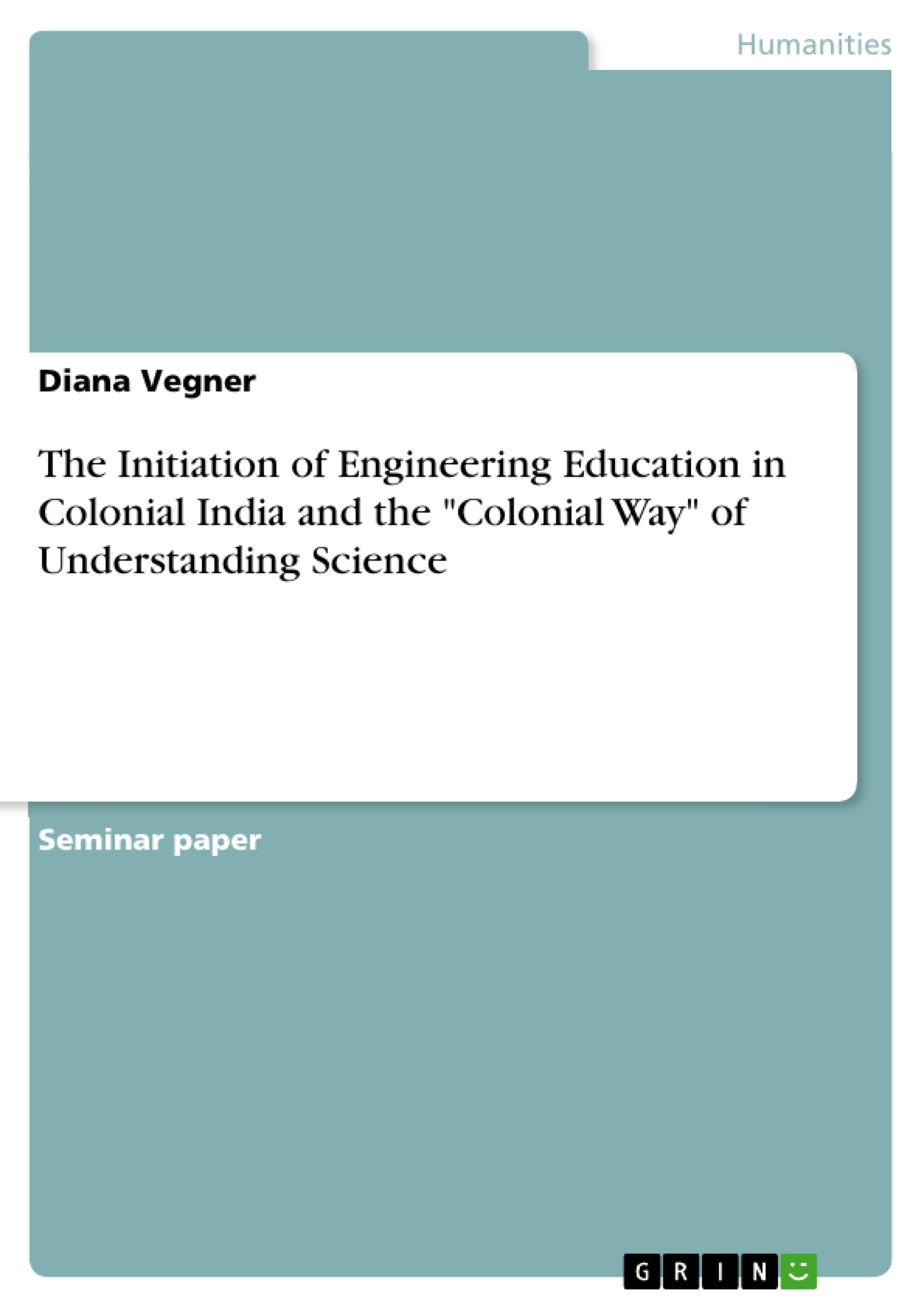This paper examines the ways in which the implementation of different kinds of science innovations had been done in the British Raj between 1858-1947. This period was powerfully influenced by new creations from the European and Indian people within the system of Colonial rule. The paper traces and compares the different understanding of science and technology. Therefore, it will contrast the relationship of science between Indians and English people. In order to comprehend “colonial science”, it is first of all important to understand the development and knowledge of local traditional (or indigenous) and European (especially the British) understanding and knowledge of science. The paper seeks to give a precise answer to the reason why the development of technology and science was so vital then. The next main part deals with engineering teaching and learning and how the Indian caste system contributes to the participation of Indian population in engineering science.
Inhaltsverzeichnis (Table of Contents)
- Introduction
- Goal of the Paper
- Problem to be investigated
- The Beginning of New Dynamics
- Local and European Knowledge
- The Discourse about "Modern Science"
- Colonial Imperial Science
- European Knowledge in Indigenous Learning
- Manifesting European Methods
- Traditional Engineering Institutions
- Technological Surveys in India
- The Hindu College of Calcutta
- The Roorkee College and the Public Works Department
- Engineers
- Criticism
- Conclusion
Zielsetzung und Themenschwerpunkte (Objectives and Key Themes)
This paper explores the implementation of scientific innovations in British India between 1858 and 1947, highlighting the influence of European and Indian perspectives within the colonial system. It contrasts the understanding of science and technology between Indians and English people, examining the development and knowledge of both traditional and European science. The paper aims to explain the significance of technological and scientific advancements during this period and analyze the role of the Indian caste system in shaping participation in engineering science.
- The influence of European science and technology on Indian society
- The contrasting perspectives of Indians and Europeans regarding science and technology
- The role of the Indian caste system in engineering education and participation
- The development and knowledge of local (indigenous) and European science
- The impact of scientific advancements on the British Raj
Zusammenfassung der Kapitel (Chapter Summaries)
- Introduction: Introduces the paper's focus on scientific innovations in British India between 1858 and 1947. The paper examines the contrasting perspectives of European and Indian science and technology, exploring the influence of the caste system on engineering education.
- The Beginning of New Dynamics: Discusses the impact of the East India Company's "imperial order" on India, highlighting the emergence of scientific innovations and the interaction between Indian and European scientists and bureaucrats.
- Local and European Knowledge: Analyzes the relationship between local/indigenous understanding and European knowledge regarding science, engineering, and technology. The chapter challenges the historical perspective that India lacked history, emphasizing the need for a deeper understanding of Indian history and power dynamics.
- European Knowledge in Indigenous Learning: Explores the integration of European knowledge into indigenous learning systems. This chapter focuses on how European methods and ideas were adopted and adapted within Indian society.
- Manifesting European Methods: Examines the practical application of European methods in India, highlighting the impact of these methods on traditional institutions and practices.
- Traditional Engineering Institutions: Discusses the role of traditional engineering institutions in India, including the Hindu College of Calcutta, the Roorkee College, and the Public Works Department.
- Technological Surveys in India: Provides an overview of technological surveys conducted in India, focusing on the development of engineering education and the emergence of a new generation of engineers.
- Criticism: Presents criticisms of technological processes and machinery, particularly from Mohandas Karamchand Gandhi, highlighting the potential negative impacts of industrialization on the environment and society.
Schlüsselwörter (Keywords)
The key keywords of this paper include colonial science, indigenous science, imperial science, engineering education, caste system, British India, technological innovations, modernization, and scientific discourse. These terms reflect the central themes of the paper, which explores the complex relationship between science, technology, and social structures during the colonial period in India.
Frequently Asked Questions
What is the main focus of this paper on colonial engineering?
The paper examines the implementation of science and technology in British India (1858-1947) and compares European knowledge with indigenous learning.
How did the Indian caste system affect engineering education?
The paper analyzes how the caste system influenced the participation and access of the Indian population to engineering sciences.
What were the key engineering institutions in colonial India?
Notable institutions mentioned include the Hindu College of Calcutta, Roorkee College, and the Public Works Department.
What was Gandhi's stance on technological progress?
Mohandas Gandhi expressed criticism regarding industrial machinery and its potential negative impacts on society and the environment.
What does the term "Colonial Science" refer to?
It refers to the specific way science and technology were developed and understood under the British Raj, often contrasting with local traditional knowledge.
- Quote paper
- Diana Vegner (Author), 2019, The Initiation of Engineering Education in Colonial India and the "Colonial Way" of Understanding Science, Munich, GRIN Verlag, https://www.grin.com/document/498684



